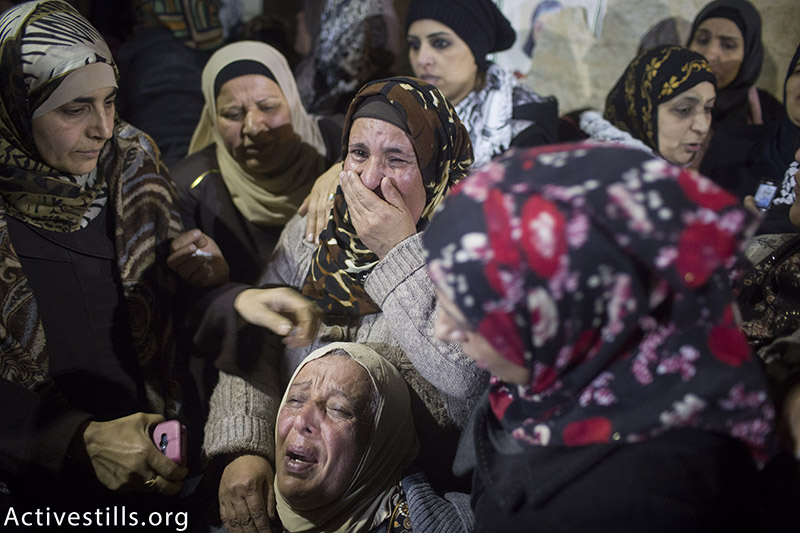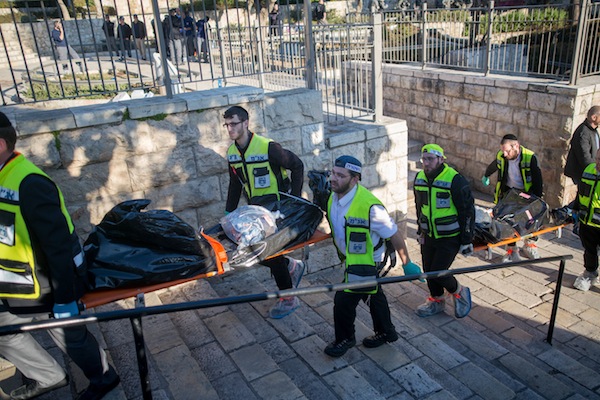
Mohammad Elayyan discovered through a Facebook post that his 22-year-old son, Bahaa, had been shot dead by Israeli forces after allegedly carrying out a stabbing and shooting attack in East Jerusalem in October 2015. It would be another 325 days before he saw the body.
“From that moment on, the agony and the long journey of struggle and pursuit of getting my son out of an Israeli refrigerator to be buried began,” Elayyan recalled, as he joined scores of other Palestinian families fighting to have their relatives’ remains returned.
The Israeli government has, since 1967, applied a policy of withholding the bodies of Palestinians killed by its security forces. There are currently over 250 bodies being held in Israeli morgues and cemeteries, according to the Jerusalem Legal Aid and Human Rights Center (JLAC), which is currently fighting for the release of 116 bodies.
This policy has stopped and started several times over the decades in response to widespread criticism. However, a Supreme Court ruling handed down on September 9 declared that Israel now has the legal right to hold on to the bodies of Palestinian suspects, “based on considerations that take into account state security, civil order, and the need to negotiate for the return of the bodies of Israeli soldiers,” stated Adalah, the Legal Center for Arab Minority Rights in Israel. The organization considers the ruling one of the Supreme Court’s most “extreme” since Israel’s establishment in 1948.
The ruling contravenes the Geneva Convention, which states that parties involved in an armed conflict must bury the deceased “if possible according to the rites of the religion to which they belonged and that their graves are respected, properly maintained, and marked in such a way that they can always be recognized.”
According to Issam Aruri, director of JLAC, the bodies are used as bargaining chips with Palestinian political factions such as Hamas, who are currently withholding the bodies of two Israeli soldiers killed during the 2014 Gaza-Israel war.
“The policy was decided that they will keep the bodies for [a] possible exchange of Israeli soldier bodies that are held in Gaza,” Aruri said. “Those bodies have only been held since 2014, but the Israelis [have been] keeping bodies for 52 years of occupation. They don’t give information about those bodies, or where they are held. For some families, they don’t know if their beloved ones are dead or alive.”
Aruri believes the ruling goes beyond security and leverage, to one designed to punish family members of those who carry out attacks against Israel. He explained that in Judaism, a dead body is highly respected, adhering to strict religious burial ceremonies which is not afforded to Palestinians whose bodies are withheld. “So in this sense, they don’t consider Palestinians as equal human beings,” Aruri said.
The majority of bodies are being held in the infamous “cemetery of numbers” — named after the numbering system used to identify the graves. Some bodies have been there since 1967, withheld in the aftermath of the Six-Day War.
Elayyan, a lawyer and activist, launched a grassroots campaign after his son was killed, bringing together families of slain Palestinians in calling on Israel to return their relatives’ remains. Although his son was released, Elayyan says he won’t rest until all the families concerned can bury their dead with dignity. “I go to all the funerals and burials of all the martyrs that are held,” he said. “It’s always the same in each one of these cases. The pain, the suffering, the agony of the families, the grief, this is almost identical in every family.”
But having the body released is only the first step. To have his son Bahaa returned, Elayyan first had to agree to certain conditions enforced by the paying of a 20,000 shekel ($5,680) bond. “It’s as if we bought the body of our son,” recounted Elayyan.

Second, like many other Palestinians killed by Israeli forces, Bahaa’s funeral was held at midnight, a consistent demand by Israeli authorities who say it prevents incitement. Israel also refused to let the family bury him in their village cemetery. Instead, his family was forced to bury him at al-Mujahidin cemetery near the Old City of Jerusalem, with the number of mourners restricted to just 25 people.
Palestinian families say these measures are designed to prevent a dignified burial, while Israel defends the policy, arguing it deters violence.
The final condition of release was to relinquish the right to have the body autopsied. Elayyan said he had approached Al Quds University in order to organize his son’s post-mortem examination. When Israeli authorities discovered Elayyan’s intent, however, they refused to release Bahaa’s body for another four months.
The state in which the bodies are returned also hinders examination, due to the long periods spent in a freezer. In 2016, a special UN investigation noted reports that bodies of deceased Palestinians were “stacked on top of each other…[and] often disfigured, sometimes beyond recognition, denying the families the right to accord, with dignity, final religious rites.”
Bahaa’s body was, Elayyan said, almost unrecognizable: after nearly a year in a freezer, his eyes had completely sunken in as if they were missing.
“The most painful [part] in this whole process is the condition of the body. The body would be held in the refrigerator under minus 30-40 degrees celsius, so it’s frozen solid, like an ice cube,” explained Elayyan. “Sometimes when a family receives the body, if it slips out of their hands, it would fall on the ground and break.
“Usually, the family [is] anxious to bury their son or daughter,” Elayyan continued. He then explained families are often dissuaded from performing autopsies as they have no legal recourse available to them. “We do the autopsy, what then?” he said. “What after this? There’s no state to represent you, or to file a case against the Israelis.” He added he has not, to date, received an official police report detailing the circumstances of his son’s death.
In the wake of the Supreme Court ruling, Elayyan says his campaign will now be appealing to international courts, having also been frustrated with the lack of assistance from the Palestinian Authority. “We have now exhausted all the legal remedies provided by the national law of Israel, and now our battle will be taken to another forum, an international forum.”
However hopeless Elayyan says he and the families often feel, it is the fight which gives them strength. “With regard to the pain of the families, whether it’s recent, or from years ago and their families [are] in a numbered graveyard, the pain is the same, it does not elapse with time.
“But the more we do to try to release the bodies, it gives us [the] power to endure the pain.”
Miriam Deprez is an Australian-born freelance journalist and photographer. Follow her on twitter at @m_deprez.
